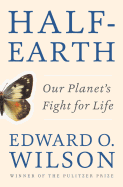
Edward O. Wilson (Letters to a Young Scientist) is a famous and sometimes controversial naturalist. Half-Earth is the last book in his trilogy on "how our species became the architects and rulers of the Anthropocene epoch, bringing consequences that will affect all of life... far into the geological future."
His recommendation is a radical one: "I am convinced that only by setting aside half the planet in reserve... can we save the living part of the environment and achieve the stabilization required for our own survival." This reserve would be a web of large protected areas connected by wild corridors that span continents. Wilson estimates that it would protect about 85% of the earth's biodiversity.
In brief chapters, Wilson considers past and ongoing extinctions, their causes, the biodiversity that exists today and how to calculate what existed before. A list of worldwide wilderness hot spots sketches out a starter map for this vast project. He uses two visionary and successful restoration projects in Florida and Mozambique to show how they can be accomplished, and how they can benefit local people as well as wildlife.
Wilson finds hope in declining human birth rates and technological advances that aid scientific understanding and make us more efficient users of natural resources. And he returns to his conviction that altruism is part of human evolution and can be extended to the natural world. "I believe we've learned enough to adopt a transcendent moral precept concerning the rest of life. It is simple and easy to say: Do no further harm to the biosphere." --Sara Catterall

